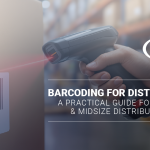What to Look for When Choosing an SAP Business One Partner: A Personal Guide from Someone Who’s Seen It All
Dear Fellow Business Leader,
I’ve been in the SAP Business One world for over 15 years now. In that time, I’ve watched hundreds of companies make the partner selection decision.
Some get it right. Their ERP becomes a competitive weapon that drives growth for years. Others get it wrong. They end up with costly disasters that set them back months or even years.
Here’s what I’ve learned: The software isn’t what makes or breaks your project. Your partner choice is everything. Let me share what I wish every manufacturing and distribution leader knew before they signed on the dotted line.
Why I’m Writing This (And Why You Should Care)
Most companies approach partner selection like they’re buying office supplies. They focus on price and basic credentials.
That’s a mistake that costs a lot of time and money.
Your SAP Business One implementation will likely be the biggest technology investment you make this decade. The partner you choose determines whether that investment pays off or becomes a cautionary tale.
I’ve seen identical companies implement the same software with completely different outcomes. The only difference? Their partner choice.
Let me tell you about two manufacturers I know personally.
Company A picked a big-name partner with impressive certifications. Fourteen months later, they were 40% over budget with a system that broke every time SAP released an update.
Company B chose a manufacturing-focused partner with deep SAP expertise. Six months to go-live. Under budget. Zero major issues.
Same software. Different partners. Completely different outcomes.
The Four Things That Actually Matter
After watching dozens of implementations succeed and fail, I’ve identified four factors that separate great partners from mediocre ones.
Most people focus on the wrong things. They look at company size or marketing materials instead of what actually drives results.
Here’s what really matters:
- Technical Expertise Not just certifications. Real, deep knowledge of the platform.
- Industry Specialization They need to understand your specific business challenges.
- Implementation Approach How they manage change and transfer knowledge to your team.
- Long-Term Partnership Value What happens after go-live determines your long-term success.
Let me walk you through each one.
Technical Expertise: Beyond the Marketing Brochure
Every partner claims to be an expert. Few actually are. Here’s how to tell the difference.
Look for 100% SAP Focus
Many “Premier Partners” sell multiple ERP platforms. They’re generalists trying to be everything to everyone.
You want a specialist. Someone who lives and breathes SAP Business One every day.
When their business depends entirely on SAP success, they have skin in the game. They can’t afford to give you mediocre results.
Check for Certified Apps & Add-Ons
This is my secret weapon for evaluating technical depth.
Partners who build SAP-certified extensions understand the platform at a level that consultants never will. They know the architecture. They have relationships with SAP’s engineering teams.
For manufacturing and distribution, this matters enormously. You need warehouse management that integrates seamlessly with your ERP. Partners with certified WMS solutions can deliver that without the headache of managing multiple vendors.
Ask About Team Consistency
Here’s something most people miss: Will the same team that designs your system also implement it?
Too many partners use a bait-and-switch approach. Senior consultants sell the project, then hand it off to junior resources for implementation.
You want the people who understand your requirements to be the ones configuring your system and supporting your team after the go-live date. Ask specifically about this. It’s a make-or-break factor.
Industry Specialization: Why Generic Doesn’t Work
SAP Business One is powerful, but manufacturing and distribution have unique requirements. Your partner needs to understand your world.
Manufacturing Process Knowledge
Can they discuss bill of materials management in detail? Do they understand the difference between make-to-order and make-to-stock operations?
If they’re stumbling through basic manufacturing concepts, they’ll struggle with your implementation.
Look for partners who’ve developed specialized manufacturing solutions. Shop floor data collection systems. Production dashboards. Quality management extensions.
These aren’t nice-to-haves. They’re proof that the partner understands manufacturing operations deeply enough to extend the platform meaningfully.
Distribution and Warehouse Complexity
Distribution is getting more complex every year. EDI integration. Lot tracking. Multiple warehouses. Third-party logistics.
Now add automation. AS/RS systems. Autonomous mobile robots. Conveyor integration.
Your partner needs experience with these technologies. As automation becomes standard, having a partner who’s already solved these integration challenges gives you a massive advantage.
Reference Architectures
Great partners develop proven approaches for common scenarios in your industry.
They should be able to show you reference architectures for businesses like yours. Not generic templates, but battle-tested configurations that solve real problems.
If they can’t explain how they’ve handled similar challenges before, they’ll be learning on your dime.
Implementation Approach: The Human Side of ERP
Here’s a truth most people don’t want to hear: Technical problems rarely kill ERP projects.
People problems do.
Your partner’s approach to change management determines whether your team embraces the new system or fights it every step of the way.
Change Management Philosophy
The best partners understand that ERP implementation is fundamentally about changing how people work.
Ask them to describe their change management process. If they focus only on technical aspects, that’s a red flag.
Training and Knowledge Transfer
Implementation projects end. Your need for expertise doesn’t.
Your partner should be focused on building your internal capabilities, not creating ongoing dependencies.
Look for comprehensive training programs. Detailed documentation tailored to your specific configuration. Clear processes for transitioning system administration to your team.
If they seem evasive about knowledge transfer, they’re planning to keep you dependent on their consulting services.
Risk Mitigation
Every implementation hits unexpected challenges. Data quality issues. Integration complications. Scope changes.
Your partner’s ability to anticipate and handle these challenges determines whether minor issues become major disasters.
They should be able to discuss common risks in your industry and their strategies for managing them. More importantly, ask for examples of how they’ve handled significant challenges in past projects.
Long-Term Partnership: Beyond Go-Live
Implementation is just the beginning. The real value comes from ongoing optimization and enhancement.
Your partner choice determines whether your ERP becomes a strategic asset or a maintenance burden.
Support Model
When something breaks at 2 PM on a Tuesday, who answers the phone?
This seems like a simple question, but many partners use complex support structures that make it hard to get help when you need it.
You want direct access to the people who know your system. Internal support teams, not outsourced call centers.
Ask specifically: Will support tickets be handled by your internal team or routed to contractors? Do your support people have direct access to the developers who built your add-on solutions?
Enhancement Capabilities
Your business will change. Your ERP needs to change with it.
Look for partners with proven development capabilities. Not just the ability to configure standard features, but to build custom solutions when business requirements demand them.
They should be able to discuss their development methodologies and how they ensure customizations remain supportable through SAP updates.
Strategic Advisory
The best partners evolve from vendors to trusted advisors.
They understand your business model. They track industry trends. They proactively recommend improvements to your processes and system configuration.
This kind of strategic partnership delivers value far beyond the initial implementation cost.
Red Flags That Should Send You Running
I’ve seen enough bad implementations to recognize the warning signs early.
- Multi-Platform Partners
If they sell other ERP systems alongside SAP Business One, walk away. Divided attention leads to shallow expertise. You’ll get generic advice instead of SAP-specific best practices.
- Unrealistic Timelines
Partners who promise lightning-fast implementations are either inexperienced or planning to cut corners. Manufacturing and distribution implementations typically take 4-8 months. Anyone promising significantly less isn’t being honest about the complexity involved.
- Vague Support Models
If they can’t clearly explain their post-implementation support services and pricing, you’ll face unpleasant surprises after go-live. Get everything in writing before you sign.
How We Do Things Differently at N’ware
I’m not going to pretend we’re perfect. But I can tell you exactly why we’ve been successful for over 30 years.
We made a strategic decision early on: 100% focus on the SAP ecosystem. SAP Business One isn’t just another product line for us. It’s our entire business. This focus has allowed us to develop expertise that generalist partners simply can’t match.
Our certified WMS app, LISA WMS, is proof of this commitment. We didn’t just resell someone else’s warehouse management system. We built our own, specifically for SAP Business One, and got it SAP-certified.
That means seamless integration. Unified support. No vendor finger-pointing when issues arise.
We’ve extended this approach across our entire tool set:
All built specifically for SAP Business One.
Our unique WMS Center of Expertise keeps us at the edge of warehouse automation technologies. Our deep supply chain expertise and product portfolio allows SAP Business One users to select from three leading inventory management software.
With LISA WMS, Produmex and Infios as options, we ensure a complete alignment of needs with functionality.
And as more distribution centers adopt robotics and automation, we’re helping clients integrate these solutions to their SAP system as well.
But what really sets us apart is our Client Care program.
It’s included with every SAP Business One support plan for our clients. No additional cost to your SAP license.
You get a single point of contact dedicated entirely to your success.
Not a different person every time you call. Not a ticket system that bounces you around departments. One specialist who knows your business.
Our Client Care team doesn’t just wait for problems.
They reach out proactively, identify opportunities to maximize your system investment, and even coordinate with our certified consultants to create educational content that actually helps your team.
It’s long-term support designed for long-term satisfaction. Because when you succeed, we succeed.
Your Next Steps
Choosing an SAP Business One partner is one of the most important decisions you’ll make as a business leader.
Don’t rush it. Don’t focus on price alone. Don’t be swayed by impressive marketing materials.
Use the framework I’ve outlined here to evaluate your options systematically. Ask hard questions. Check references thoroughly.
Most importantly, trust your instincts. If something feels off during the evaluation process, it probably is.
The right partner will transform your ERP implementation from a risky project into a competitive advantage that drives growth for years to come.
The wrong partner will cost you time, money, and credibility with your team.
Choose wisely.
If you’d like to discuss your specific situation, I’m always happy to have a conversation. Even if we’re not the right fit for your project, I can usually point you in the right direction.
Your success is what matters most.
Best regards,






